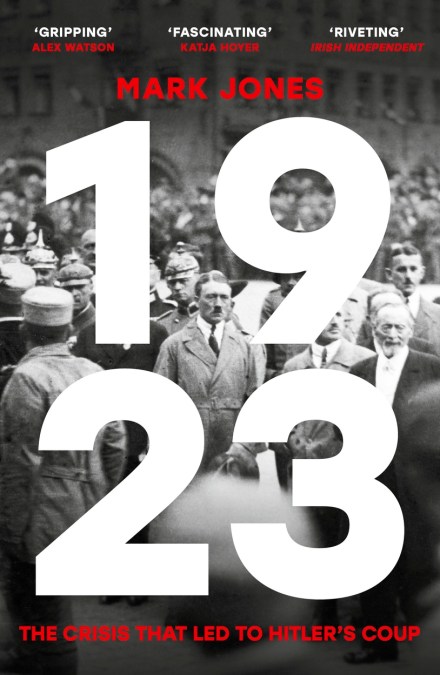A BBC HISTORY MAGAZINE BOOK OF THE YEAR
‘Excellent’ Richard Evans
‘A vivid, crisp, impressively sustained narrative’ Financial Times
‘Riveting’ Irish Independent
‘Refreshing and readable’ Irish Times
‘Gripping . . . thoroughly researched and beautifully written . . . a warning for our times’ Alex Watson, author of Ring of Steel
‘Fascinating . . . shows powerfully that there was nothing inevitable about the survival of Germany’s young democracy in that year – nor about its death a decade later. A timely reminder’ Katja Hoyer, author of Beyond the Wall
The astonishing year when German democracy faced crisis and near destruction.
1923 was one of the most remarkable years of modern European history. In January, France and Belgium militarily occupied Germany’s economic heartland, the Ruhr; triggering a series of crises that almost spiralled out of control. Hyperinflation plunged millions into poverty. The search for scapegoats empowered political extremes. Hitler’s populism ascended to national prominence. Communists, Nazis, separatists all thought that they could use the crises to destroy democracy.
None succeeded. 1923 was the year of Hitler’s first victory – and his first defeat. Fanning the flames of instability, anti-government and antisemitic sentiment, the Nazis’ abortive yet pivotal putsch in a Munich beer hall failed when they were abandoned by their likeminded conservative allies.
Drawing on previously unseen sources, Mark Jones weaves together a thrilling and resonant narrative of German lives in this turbulent time. Tracing Hitler’s rise, we see how political pragmatism and international cooperation eventually steered the nation away from total insurrection. A decade later, when Weimar democracy eventually succumbed to tyranny, the warnings from 1923 – rising of nationalist rhetoric, fragile European consensus, and underestimation the of the enemies of liberalism – became only too apparent.
This account of the republic’s convulsions and survival offers a gripping image of a modern society in extreme crisis.
‘Excellent’ Richard Evans
‘A vivid, crisp, impressively sustained narrative’ Financial Times
‘Riveting’ Irish Independent
‘Refreshing and readable’ Irish Times
‘Gripping . . . thoroughly researched and beautifully written . . . a warning for our times’ Alex Watson, author of Ring of Steel
‘Fascinating . . . shows powerfully that there was nothing inevitable about the survival of Germany’s young democracy in that year – nor about its death a decade later. A timely reminder’ Katja Hoyer, author of Beyond the Wall
The astonishing year when German democracy faced crisis and near destruction.
1923 was one of the most remarkable years of modern European history. In January, France and Belgium militarily occupied Germany’s economic heartland, the Ruhr; triggering a series of crises that almost spiralled out of control. Hyperinflation plunged millions into poverty. The search for scapegoats empowered political extremes. Hitler’s populism ascended to national prominence. Communists, Nazis, separatists all thought that they could use the crises to destroy democracy.
None succeeded. 1923 was the year of Hitler’s first victory – and his first defeat. Fanning the flames of instability, anti-government and antisemitic sentiment, the Nazis’ abortive yet pivotal putsch in a Munich beer hall failed when they were abandoned by their likeminded conservative allies.
Drawing on previously unseen sources, Mark Jones weaves together a thrilling and resonant narrative of German lives in this turbulent time. Tracing Hitler’s rise, we see how political pragmatism and international cooperation eventually steered the nation away from total insurrection. A decade later, when Weimar democracy eventually succumbed to tyranny, the warnings from 1923 – rising of nationalist rhetoric, fragile European consensus, and underestimation the of the enemies of liberalism – became only too apparent.
This account of the republic’s convulsions and survival offers a gripping image of a modern society in extreme crisis.
Newsletter Signup
By clicking ‘Sign Up,’ I acknowledge that I have read and agree to Hachette Book Group’s Privacy Policy and Terms of Use
Reviews
Deftly written and lucid . . . a masterful interpretation of a fateful year
Meticulously researched and elegantly written, 1923 explains how Germany stood on the brink of chaos in that crisis year and then stepped back. Highly recommended
Scary . . . Jones's book asks where we are today - at the end of the troubles, or at the beginning?
Fascinating . . . shows powerfully that there was nothing inevitable about the survival of Germany's young democracy in that year - nor about its death a decade later. A timely reminder
Gripping . . . Thoroughly researched and beautifully written, Mark Jones's story of a democracy under terrible pressure is a warning for our times
A crisp and methodical chronicle of the year Germany went wrong . . . Jones traces the eruption in a deftly detailed and convincing narrative . . . His vivid history of Germany in 1923 is a timely alert to the dangers of repetition
A hundred years on, the profound crisis of 1923 seems uncomfortably similar to the challenges experienced by many democracies today: the rise of political extremism, runaway inflation, and resistance to foreign occupation are back in the news today, but they are certainly not new. Jones's meticulously researched and splendidly written book brings this dark but forgotten year back to life
Riveting
Refreshing and readable
A vivid, crisp, impressively sustained narrative
Jones's fascinating book gives us a timely lesson in the fragility of democracy
Excellent
Gripping narrative of the extraordinary year in which Weimar Germany was struck by successive blows, though it somehow survived for another ten years

